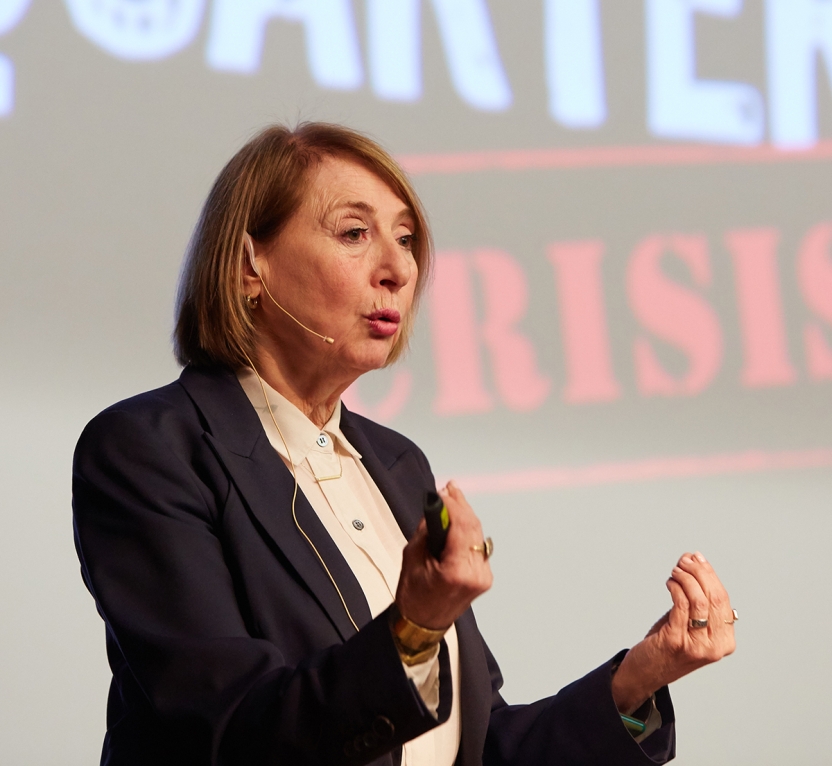Speaker Says Higher Education Needs to Move Beyond 19th-Century Model

MIDDLEBURY, Vt. – Cathy N. Davidson, an advocate for adapting higher education to meet the demands and perils of the Internet age, shared ideas for reimagining American higher education for a Middlebury College audience on January 10 in Dana Auditorium.
The author of The New Education: How to Revolutionize the University to Prepare Students for a World in Flux (Basic Books, 2017), Davidson argues that education in the United States is stuck with a model that was developed between 1865 and 1925.
The American education system “was created because of an industrial-technical-economic crisis during that particular time period,” she says, “and my argument is that we need to adapt education for the world we live in now, and we need to think again about all of the infrastructures in education, all of the systems of credentialing and grading, and do it in a way that makes sense for today.”
Davidson believes that those “infrastructures” and “systems”—including K–12 curriculum requirements, mandatory grades, multiple-choice testing, minors, majors, electives, divisions, credit hours, and degree requirements—are at odds with a world that is being transformed daily by technology and globalization. “How do we educate students for a world where anyone with an Internet connection can communicate anything they want to anybody else with an Internet connection?”
“The last 10 years have been marked by a bogus attempt by people to say what we need to do to change education, and that bogus thing is often called ‘unbundling.’ It was the same idea that higher education has all these frills like arts, like humanities, like even social sciences, and what we really need to emphasize is STEM (science, technology, engineering, and mathematics) and get rid of everything else.”
Davidson spoke at length about a different approach at Yale University’s history department, where undergraduate students determine the content of a “cohort” class rather than a prescribed “core” course, and where history majors must declare either a “global” or “specialist” track to their concentration, rather than the more traditional (and less interdisciplinary) pathway of selecting either a time period or a geographic region.
A distinguished professor of English at the Graduate Center of the City University of New York (CUNY) and founding director of the Futures Initiative there, Davidson highlighted some of the other work being done to rethink higher education, such as Professor Zeynep Tufekci’s “defensive driving” course for the digital world at the University of North Carolina that addresses online fraud, bots, trolls, and manipulation. She also pointed to Virginia Commonwealth University’s master’s program in “digital sociology” that examines the effects of big data, Internet privacy, and algorithms on society; and the Red House at Georgetown University, a space where faculty, staff, and students come together in a “curriculum incubator” to develop curricular experiments that break old boundaries and serve a new generation of students and alumni.
“When people say that higher education never changes, I disagree,” Davidson offered. “I see lots of changes happening in lots of places. Lots of the old models have changed. Right now, we are at a moment where educators are paying attention to figuring out how we can make higher education more relevant to the world we live in.”
Middlebury’s President Laurie L. Patton, who taught at Duke University with Davidson and introduced her to the Middlebury audience, said, “Middlebury should listen to Cathy because we are part of that community, and the revolution she advocates for is overdue. Our 21st-century world is being transformed by technology and globalization, and we need our students to be the drivers of change and not just subject to it.”
Davidson delivered her lecture in TED-Talk style, standing center stage without notes and just a handful of PowerPoint images projected behind her. She concluded with six “what-ifs” designed to revolutionize the university for a world in flux. Asked Davidson, what if:
- teaching and learning were not tied to credit hours and academic calendars?
- grades and test scores were no longer the measures for success?
- classrooms were active and student led?
- students could work on bachelor’s and master’s degrees simultaneously?
- digital literacy was taught as a foundational skill?
- universities created partnerships across diverse institutions?
Ninety minutes after she began, it was clear to all that “no one surfs the information tsunami with more skill and more energy and more vision than Cathy Davidson,” as Patton noted in her introduction of one of the most thoughtful voices calling out for a more student-centered system of higher education today.
Reporting by Robert Keren, Photo by Todd Balfour.

